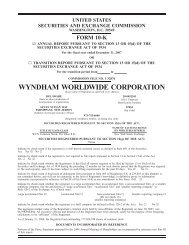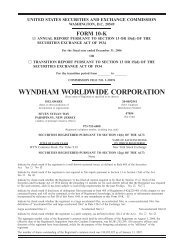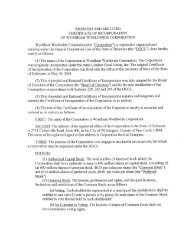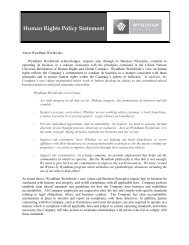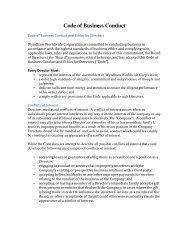WYNDHAM WORLDWIDE CORPORATION
WYNDHAM WORLDWIDE CORPORATION
WYNDHAM WORLDWIDE CORPORATION
You also want an ePaper? Increase the reach of your titles
YUMPU automatically turns print PDFs into web optimized ePapers that Google loves.
Competition<br />
Competition is robust among the lodging brand franchisors to grow their franchise systems and retain their<br />
existing franchisees. We believe existing and potential franchisees make decisions based principally upon the<br />
perceived value and quality of the brand and the services offered to franchisees. We further believe that the<br />
perceived value of a brand name is, to some extent, a function of the success of the existing hotels franchised under<br />
the brands. We believe that existing and prospective franchisees value a franchise based upon their views of the<br />
relationship between the costs, including costs of conversion and affiliation, to the benefits, including potential for<br />
increased revenues and profitability, and upon the reputation of the franchisor.<br />
The ability of an individual franchisee to compete may be affected by the location and quality of its property,<br />
the number of competing properties in the vicinity, community reputation and other factors. A franchisee’s success<br />
may also be affected by general, regional and local economic conditions. The potential negative effect of these<br />
conditions on our results of operations is substantially reduced by virtue of the diverse geographical locations of our<br />
franchised hotels and by the scale of our franchisee base. Our franchise system is dispersed among almost 5,600<br />
franchisees, which reduces our exposure to any one franchisee. No one franchisee accounts for more than 3% of our<br />
franchised hotels or total segment revenues.<br />
<strong>WYNDHAM</strong> EXCHANGE & RENTALS<br />
Vacation Exchange and Rentals Industry<br />
The over $60 billion global vacation exchange and rentals industry is largely a fee-for-service business and has<br />
been a growing segment of the hospitality industry. The industry offers services and products to both leisure<br />
travelers and vacation property owners. For leisure travelers, the industry offers access to a range of fully-furnished<br />
vacation properties, which include privately-owned vacation homes, villas, cottages, apartments and condominiums,<br />
vacation ownership resorts, inventory at hotels and resorts, boats and yachts. The industry offers leisure travelers<br />
flexibility (subject to availability) in time of travel and choice of lodging options in regions where travelers may not<br />
typically have access to such choices. For vacation property owners, affiliations with vacation exchange companies<br />
allow owners of vacation intervals to exchange their interests in vacation properties for vacation time at other<br />
properties or for other various services and products. Additionally, affiliation with vacation rental companies<br />
provides property owners the ability to have their properties marketed and rented and, in some instances, to transfer<br />
the responsibility of managing such properties.<br />
To participate in a vacation exchange, an owner generally contributes their interval to an exchange company’s<br />
network and then indicates the particular resort or geographic area where the owner would like to travel, the size of<br />
the unit desired and the period during which the owner would like to vacation. The exchange company then rates the<br />
owner’s contributed intervals based upon a number of factors, including the location and size of the unit or units, the<br />
quality of the resort or resorts and the time period or periods during which the intervals entitle the owner to<br />
vacation. An exchange may then be completed based on these conditions. Exchange companies generally derive<br />
revenues from owners of intervals by charging exchange fees for facilitating exchanges and through annual<br />
membership dues. In 2009, 72% of owners of intervals were members of vacation exchange companies, and 54% of<br />
such owners exchanged their intervals through such exchange companies.<br />
The long-term trend in the vacation exchange industry has been growth in the number of members of vacation<br />
exchange companies. Current economic conditions have resulted in slower growth, but we believe that an economic<br />
recovery will support a return to stronger growth. In 2009, there were approximately 6.1 million members industrywide<br />
who completed approximately 3.3 million exchanges. Within the broader long-term growth trend of the<br />
vacation exchange industry, there is also a trend where timeshare developers are enrolling members in private label<br />
clubs, where members have the option to exchange within the club or through external exchange channels. The club<br />
trend has a positive impact on the average number of members, but a negative effect on the number of exchange<br />
transactions per average member and revenue per member.<br />
The vacation rental industry offers vacation property owners the opportunity to rent their properties to leisure<br />
travelers for periods of time. The vacation rental industry is not as organized as the lodging industry in that the<br />
vacation rental industry does not have global reservation systems or brands. The industry is divided broadly into two<br />
segments. The first is the serviced rental segment, where the homeowner provides their property to an agent to rent,<br />
in a majority of cases, on an exclusive basis and the agent receives a commission for marketing the property,<br />
managing bookings and providing quality assurance to the renter. The other segment of the industry is the listing<br />
business, where there is no exclusive relationship and the property owner pays a fixed fee for an online listing or a<br />
directory listing with minimal additional services, typically with no direct booking ability or quality assurance<br />
services. Typically, serviced vacation rental companies collect rent in advance and, after deducting the applicable<br />
commissions, remit the net amounts due to the property owners and/or property managers. In addition to<br />
commissions, serviced vacation rental companies may earn revenues from rental customers through fees that are<br />
13



